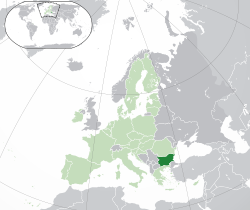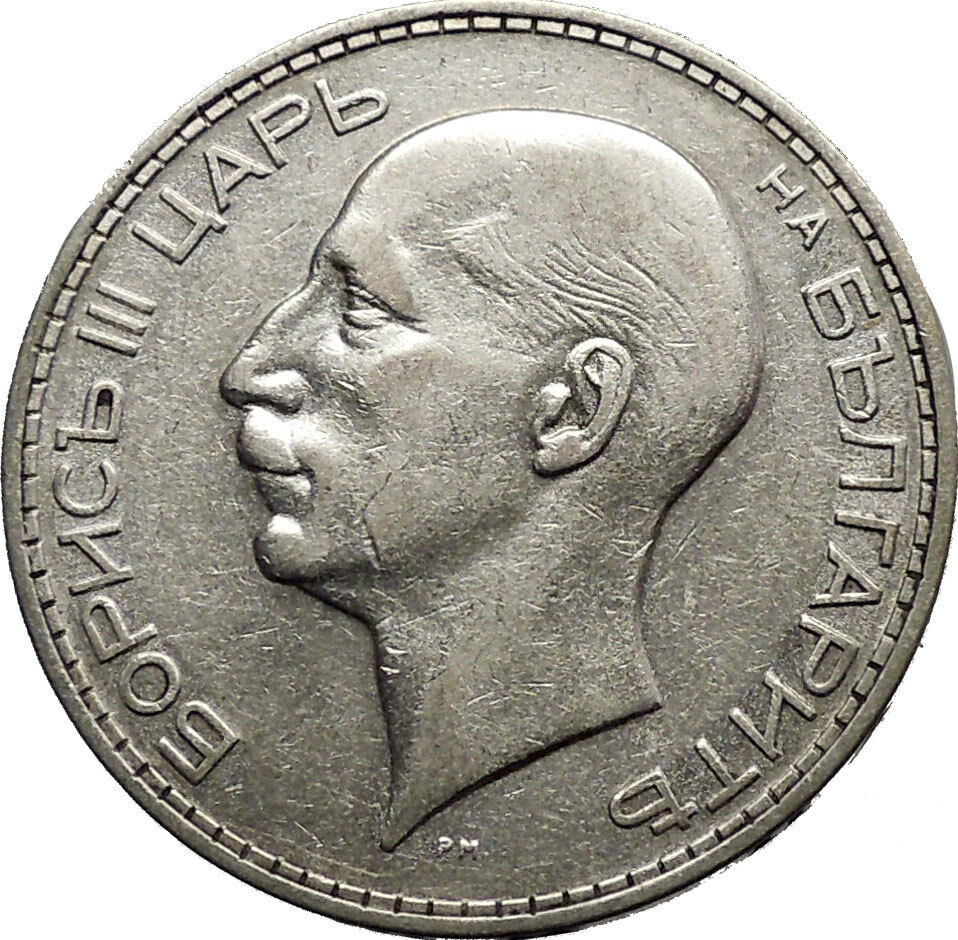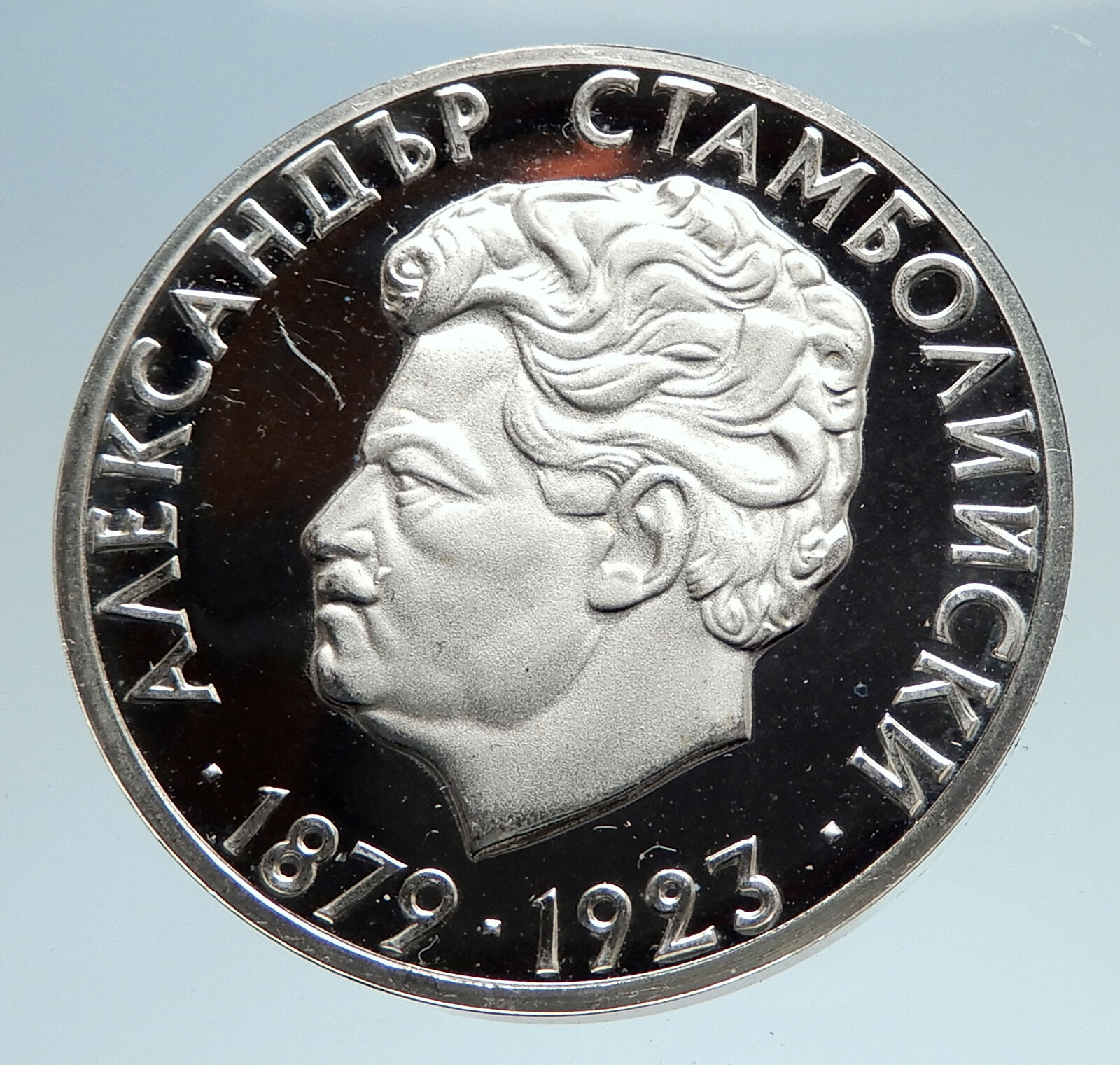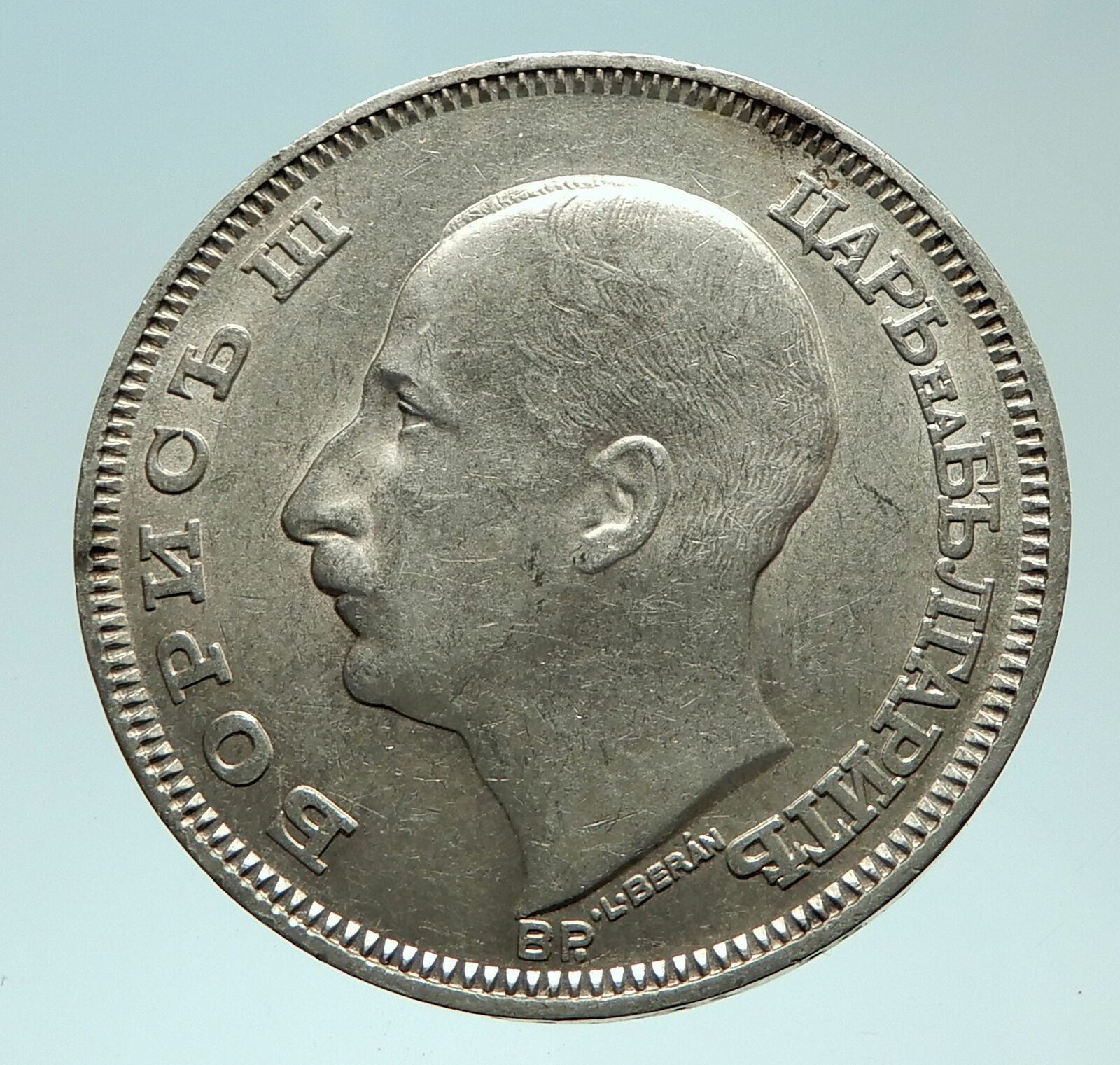|
Bulgaria – 50th Anniversary – Death of Alexander Stamboliiski, Politician
1974 Silver 5 Leva 36mm (20.60 grams) 0.900 Silver (0.5932 oz. ASW)
Reference: KM# 91
НАРОДНА РЕПУБЛИКА БЪЛГАРИЯ 1974 5 ЛЕВА, Coat of arms of People’s Republic of Bulgaria. Denomination and date.
АЛЕКСАНДЪР СТАМБОЛИЙСКИ ∙ 1879 ∙ 1923 ∙, Portrait of Alexander Stamboliiski.
You are bidding on the exact item pictured, provided with a Certificate of Authenticity and Lifetime Guarantee of Authenticity.
.jpg/220px-BASA-950K-3-110-1-Aleksandar_Stamboliyski_in_Paris,_1921_(cropped).jpg) Aleksandar Stoimenov Stamboliyski (Bulgarian: Александър Стоименов Стамболийски, variously transliterated such as Aleksandar/Alexander Stamboliyski/Stamboliiski/Stamboliski; 1 March 1879 – 14 June 1923) was the prime minister of Bulgaria from 1919 until 1923. Stamboliyski was a member of the Agrarian Union, an agrarian peasant movement which was not allied to the monarchy, and edited their newspaper. He opposed the country’s participation in World War I and its support for the Central Powers. In a famous incident during 1914 Stamboliyski’s patriotism was challenged when members of the Bulgarian parliament questioned whether he was Bulgarian or not, to which he shouted in response “At a moment, like the current, when our brothers South Slavs are threatened, I am neither a Bulgarian nor a Serb, I am a South Slav (Yugoslav)!”. This statement relates to his belief in a Balkan Federation which would unite the region and supersede many of the national identities which existed at the time.[citation needed] He was court-martialed and sentenced to life in prison in 1915 due to his opposition to Bulgaria joining the Central Powers in WWI. Aleksandar Stoimenov Stamboliyski (Bulgarian: Александър Стоименов Стамболийски, variously transliterated such as Aleksandar/Alexander Stamboliyski/Stamboliiski/Stamboliski; 1 March 1879 – 14 June 1923) was the prime minister of Bulgaria from 1919 until 1923. Stamboliyski was a member of the Agrarian Union, an agrarian peasant movement which was not allied to the monarchy, and edited their newspaper. He opposed the country’s participation in World War I and its support for the Central Powers. In a famous incident during 1914 Stamboliyski’s patriotism was challenged when members of the Bulgarian parliament questioned whether he was Bulgarian or not, to which he shouted in response “At a moment, like the current, when our brothers South Slavs are threatened, I am neither a Bulgarian nor a Serb, I am a South Slav (Yugoslav)!”. This statement relates to his belief in a Balkan Federation which would unite the region and supersede many of the national identities which existed at the time.[citation needed] He was court-martialed and sentenced to life in prison in 1915 due to his opposition to Bulgaria joining the Central Powers in WWI.
In 1918, with the defeat of Bulgaria as an ally of the Central Powers, Tsar Ferdinand abdicated in favor of his son Tsar Boris III who released Stamboliyski from prison. He joined the government in January, 1919, and was appointed prime minister on October 14 of that year. On March 20, 1920, the Agrarian Union won national elections and Stamboliyski was confirmed as prime minister.
During his term in office, Stamboliyski made a concerted effort to improve relations with the rest of Europe. This resulted in Bulgaria becoming the first of the defeated states to join the League of Nations in 1920. Though popular with the peasants, he antagonized the middle class and military. Many considered him to be a virtual dictator or a peasant thug. He was ousted in a military coup in June 1923. He attempted to raise a rebellion against the new government, but was captured by the IMRO, who detested him for renouncing Bulgarian claims on the territory of Macedonia, was brutally tortured, and killed.
Born to a farmer, Aleksandar Stamboliyski spent his childhood in his birth village of Slavovitsa [bg], the same village where he would later gather several thousand insurrectionists from the region and advance against the town of Pazardzhik. However, before this grand counter-insurgence was to transpire, Stamboliyski had to work himself up the ranks of the nation’s political scene as the leader of the Bulgarian Agrarian People’s Union. Although successful in his political ambition of acquiring the highest political office of the state, the unstable political atmosphere of Bulgaria in the early inter-war years ultimately contributed to Stamboliyski’s demise.

Bulgaria (Bulgarian: България, tr. Bǎlgariya), officially the Republic of Bulgaria (Bulgarian: Република България, tr. Republika Bǎlgariya, IPA: [rɛˈpublikɐ bɐɫˈɡarijɐ]), is a country in southeastern Europe. It is bordered by Romania to the north, Serbia and Macedonia to the west, Greece and Turkey to the south, and the Black Sea to the east. With a territory of 110,994 square kilometres (42,855 sq mi), Bulgaria is Europe’s 16th-largest country.
 Organised prehistoric cultures began developing on current Bulgarian lands during the Neolithic period. Its ancient history saw the presence of the Thracians, Ancient Greeks, Persians, Celts, Romans, Goths, Alans and Huns. The emergence of a unified Bulgarian state dates back to the establishment of the First Bulgarian Empire in 681 AD, which dominated most of the Balkans and functioned as a cultural hub for Slavs during the Middle Ages. With the downfall of the Second Bulgarian Empire in 1396, its territories came under Ottoman rule for nearly five centuries. The Russo-Turkish War of 1877-78 led to the formation of the Third Bulgarian State. The following years saw several conflicts with its neighbours, which prompted Bulgaria to align with Germany in both world wars. In 1946 it became a one-party socialist state as part of the Soviet-led Eastern Bloc. In December 1989 the ruling Communist Party allowed multi-party elections, which subsequently led to Bulgaria’s transition into a democracy and a market-based economy. Organised prehistoric cultures began developing on current Bulgarian lands during the Neolithic period. Its ancient history saw the presence of the Thracians, Ancient Greeks, Persians, Celts, Romans, Goths, Alans and Huns. The emergence of a unified Bulgarian state dates back to the establishment of the First Bulgarian Empire in 681 AD, which dominated most of the Balkans and functioned as a cultural hub for Slavs during the Middle Ages. With the downfall of the Second Bulgarian Empire in 1396, its territories came under Ottoman rule for nearly five centuries. The Russo-Turkish War of 1877-78 led to the formation of the Third Bulgarian State. The following years saw several conflicts with its neighbours, which prompted Bulgaria to align with Germany in both world wars. In 1946 it became a one-party socialist state as part of the Soviet-led Eastern Bloc. In December 1989 the ruling Communist Party allowed multi-party elections, which subsequently led to Bulgaria’s transition into a democracy and a market-based economy.

Bulgaria’s population of 7.2 million people is predominantly urbanised and mainly concentrated in the administrative centres of its 28 provinces. Most commercial and cultural activities are centred on the capital and largest city, Sofia. The strongest sectors of the economy are heavy industry, power engineering, and agriculture, all of which rely on local natural resources.
The country’s current political structure dates to the adoption of a democratic constitution in 1991. Bulgaria is a unitary parliamentary republic with a high degree of political, administrative, and economic centralisation. It is a member of the European Union, NATO, and the Council of Europe; a founding state of the Organization for Security and Co-operation in Europe (OSCE); and has taken a seat at the UN Security Council three times.
|





.jpg/220px-BASA-950K-3-110-1-Aleksandar_Stamboliyski_in_Paris,_1921_(cropped).jpg) Aleksandar Stoimenov Stamboliyski (Bulgarian: Александър Стоименов Стамболийски, variously transliterated such as Aleksandar/Alexander Stamboliyski/Stamboliiski/Stamboliski; 1 March 1879 – 14 June 1923) was the prime minister of Bulgaria from 1919 until 1923. Stamboliyski was a member of the Agrarian Union, an agrarian peasant movement which was not allied to the monarchy, and edited their newspaper. He opposed the country’s participation in World War I and its support for the Central Powers. In a famous incident during 1914 Stamboliyski’s patriotism was challenged when members of the Bulgarian parliament questioned whether he was Bulgarian or not, to which he shouted in response “At a moment, like the current, when our brothers South Slavs are threatened, I am neither a Bulgarian nor a Serb, I am a South Slav (Yugoslav)!”. This statement relates to his belief in a Balkan Federation which would unite the region and supersede many of the national identities which existed at the time.[citation needed] He was court-martialed and sentenced to life in prison in 1915 due to his opposition to Bulgaria joining the Central Powers in WWI.
Aleksandar Stoimenov Stamboliyski (Bulgarian: Александър Стоименов Стамболийски, variously transliterated such as Aleksandar/Alexander Stamboliyski/Stamboliiski/Stamboliski; 1 March 1879 – 14 June 1923) was the prime minister of Bulgaria from 1919 until 1923. Stamboliyski was a member of the Agrarian Union, an agrarian peasant movement which was not allied to the monarchy, and edited their newspaper. He opposed the country’s participation in World War I and its support for the Central Powers. In a famous incident during 1914 Stamboliyski’s patriotism was challenged when members of the Bulgarian parliament questioned whether he was Bulgarian or not, to which he shouted in response “At a moment, like the current, when our brothers South Slavs are threatened, I am neither a Bulgarian nor a Serb, I am a South Slav (Yugoslav)!”. This statement relates to his belief in a Balkan Federation which would unite the region and supersede many of the national identities which existed at the time.[citation needed] He was court-martialed and sentenced to life in prison in 1915 due to his opposition to Bulgaria joining the Central Powers in WWI. 
 Organised prehistoric cultures began developing on current Bulgarian lands during the Neolithic period. Its ancient history saw the presence of the Thracians, Ancient Greeks, Persians, Celts, Romans, Goths, Alans and Huns. The emergence of a unified Bulgarian state dates back to the establishment of the First Bulgarian Empire in 681 AD, which dominated most of the Balkans and functioned as a cultural hub for Slavs during the Middle Ages. With the downfall of the Second Bulgarian Empire in 1396, its territories came under Ottoman rule for nearly five centuries. The Russo-Turkish War of 1877-78 led to the formation of the Third Bulgarian State. The following years saw several conflicts with its neighbours, which prompted Bulgaria to align with Germany in both world wars. In 1946 it became a one-party socialist state as part of the Soviet-led Eastern Bloc. In December 1989 the ruling Communist Party allowed multi-party elections, which subsequently led to Bulgaria’s transition into a democracy and a market-based economy.
Organised prehistoric cultures began developing on current Bulgarian lands during the Neolithic period. Its ancient history saw the presence of the Thracians, Ancient Greeks, Persians, Celts, Romans, Goths, Alans and Huns. The emergence of a unified Bulgarian state dates back to the establishment of the First Bulgarian Empire in 681 AD, which dominated most of the Balkans and functioned as a cultural hub for Slavs during the Middle Ages. With the downfall of the Second Bulgarian Empire in 1396, its territories came under Ottoman rule for nearly five centuries. The Russo-Turkish War of 1877-78 led to the formation of the Third Bulgarian State. The following years saw several conflicts with its neighbours, which prompted Bulgaria to align with Germany in both world wars. In 1946 it became a one-party socialist state as part of the Soviet-led Eastern Bloc. In December 1989 the ruling Communist Party allowed multi-party elections, which subsequently led to Bulgaria’s transition into a democracy and a market-based economy.





